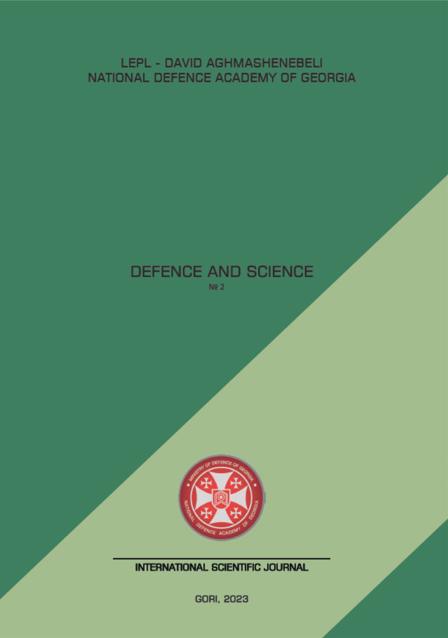The new EU energy security reality and its impact on the wider Black Sea region
DOI:
https://doi.org/10.61446/ds.2.2023.7405საკვანძო სიტყვები:
Black Sea region, Economic, Energy, Russia, Ukraine, Militaryანოტაცია
This brief in-depth research “The new EU energy security reality and its impact on the wider Black Sea region” on a security Studies was organized by David Aghmashenebeli National Defence Academy of Georgia, Germany. Its goal is to support the security of the Wider Black Sea Region energy supply chains. The purpose of this project is to answer to the main question: Will EU energy security impact the south-eastern flank of the Euro-Atlantic space.
Russia's war in Ukraine has created new problems that are not addressed by outdated security programs and old-fashioned traditional defence approaches. That the war in Ukraine is not the cause of a future conflict against the world order is not a new point of view, furthermore, the war in Ukraine is one of the results of the already existing conflict. It is a real possibility that the Kremlin will continue its aggressive foreign policy towards its neighbours and neighbours of neighbours in order to consolidate global power and "legitimacy".
The eternal war in the region exposed the EU’s economic weaknesses in energy exports and supply chains. Military professionals believe that whoever controls the east of the Euro-Atlantic space and/or dominates the Black Sea, can easily project power on the European continent, Central Europe, the Mediterranean, the North/South Caucasus and the Middle East.
Russia eternal war has shown us more dependence, weaponization, interference and more vulnerability of the EU Countries; Security is no longer based on the previously established rules. In the near future It’s unlikely that relations between the EU and Russia will be based on beneficial energy relations. The European Union is moving beyond the binary dependency that binds international actors, creating a new reality in which the inclusiveness of energy security extends to several different areas, diversification will be critical for the EU. Supply chains are complicated and messy, it’s implausible to make positive changes overnight.
Taking into account Russia sharp growth in military spending, its ability to integrate state resources and masses and it’s "great propensity for risk" makes Russia both a “capable and unpredictable actor”. Russia's blackmail to use nuclear weapons indicates that Kremlin is losing the war due to lack of ammunition and low technological capabilities and in the short term wants to take this war into a protracted or frozen conflict phase.
According to the analysis of the processes of the recent past, the stability of the region cannot be successful and effective only with the support of NATO member states on EU's eastern flank. NATO, EU and their partners should have an emergency and long-term assistance strategy for the parties. From the lesson learnt in the last 30+ years on international cooperation issues it is vital that in the next 10-30 years the Euro-Atlantic and regional countries (except Russia) in the region, must counter challenges with collective deterrence of cooperation. Actively promoting stability is possible through the existence of the theory of Russian deterrence. Stability should be achieved by promoting collective deterrence and integration of Russia; a strategy of emergency and long-term assistance not only for alliance members, but also for partners, plus collective deterrence equals fixing and integration of Russia.
Speeches and workshops used in editing this paper, Organized by the Research and Policy Analysis Department (RPA) project of Strategic Competition Seminar Series-FY23 SCSS of George C. Marshall European Center for Security Studies (GCMC) at Workshop I held in Garmisch-Partenkirchen, Germany, 20-24 February 2023 entitled “Alternative Ukrainian Future Trajectories: Implications for Russia and the West” and Workshop II held in Berlin, Germany on 16 May 2023“ (A summary of FY23 SCSS#8 hybrid seminar entitled “What if? Russian Variables, Inflection Points and Game Changers?” at SCSS Workshop II) have been very supportive in the preparation of the paper.
For the EU and its partners in the region to support the most desirable outcomes and mitigate the worst considering all scenarios discussed in the paper includes following key take-aways:
1. Relationships and cooperation matter 2. Security guarantees matter










